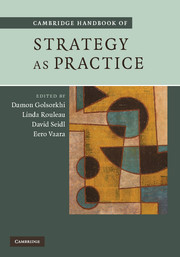Book contents
- Frontmatter
- Contents
- List of figures
- List of tables
- List of contributors
- Introduction: What is Strategy as Practice?
- PART I ONTOLOGICAL AND EPISTEMOLOGICAL QUESTIONS
- PART II THEORETICAL DIRECTIONS
- PART III METHODOLOGICAL TRACKS
- 13 Broader methods to support new insights into strategizing
- 14 Critical discourse analysis as methodology in Strategy as Practice research
- 15 Researching everyday practice: the ethnomethodological contribution
- 16 Researching strategists and their identity in practice: building ‘close-with’ relationships
- 17 Studying strategizing through narratives of practice
- PART IV APPLICATION VARIATIONS
- Author Index
- Index
- References
14 - Critical discourse analysis as methodology in Strategy as Practice research
Published online by Cambridge University Press: 05 October 2012
- Frontmatter
- Contents
- List of figures
- List of tables
- List of contributors
- Introduction: What is Strategy as Practice?
- PART I ONTOLOGICAL AND EPISTEMOLOGICAL QUESTIONS
- PART II THEORETICAL DIRECTIONS
- PART III METHODOLOGICAL TRACKS
- 13 Broader methods to support new insights into strategizing
- 14 Critical discourse analysis as methodology in Strategy as Practice research
- 15 Researching everyday practice: the ethnomethodological contribution
- 16 Researching strategists and their identity in practice: building ‘close-with’ relationships
- 17 Studying strategizing through narratives of practice
- PART IV APPLICATION VARIATIONS
- Author Index
- Index
- References
Summary
Introduction
In recent years, scholars have started to pay attention to the discursive aspects of strategizing (Knights and Morgan 1991; Hendry 2000; Samra-Fredericks 2005; Seidl 2007). These studies have highlighted the underlying assumptions of strategy as body of knowledge (Knights and Morgan 1991), the central role of narratives and other discourse forms in organizations (Barry and Elmes 1997), the importance of rhetorical skills in strategizing (Samra-Fredericks 2003, 2005) and the implications that specific conceptions of strategy have on identity and power (Mantere and Vaara 2008). This stream of research can be understood as part of the more general interest in the social and organization practices around strategy, although some scholars have argued that the Strategy as Practice movement has not been able to incorporate or develop original critical discursive perspectives on strategy (Clegg et al. 2004; Carter et al. 2008). I will in the following take a broad perspective and focus on the issue of how we can better understand the discursive aspects of strategy and strategizing from a critical angle. My intention is to try to refrain from constructing barriers between Strategy as Practice studies and critical discursive analyses, as such barriers would do a disservice both to the development of Strategy as Practice and to the promotion of critical analysis of strategy as discourse and practice.
The purpose of this chapter is to explain how critical discourse analysis (CDA) can serve to further our understanding of strategy and strategizing.
Information
- Type
- Chapter
- Information
- Cambridge Handbook of Strategy as Practice , pp. 217 - 229Publisher: Cambridge University PressPrint publication year: 2010
References
Accessibility standard: Unknown
Why this information is here
This section outlines the accessibility features of this content - including support for screen readers, full keyboard navigation and high-contrast display options. This may not be relevant for you.Accessibility Information
- 16
- Cited by
